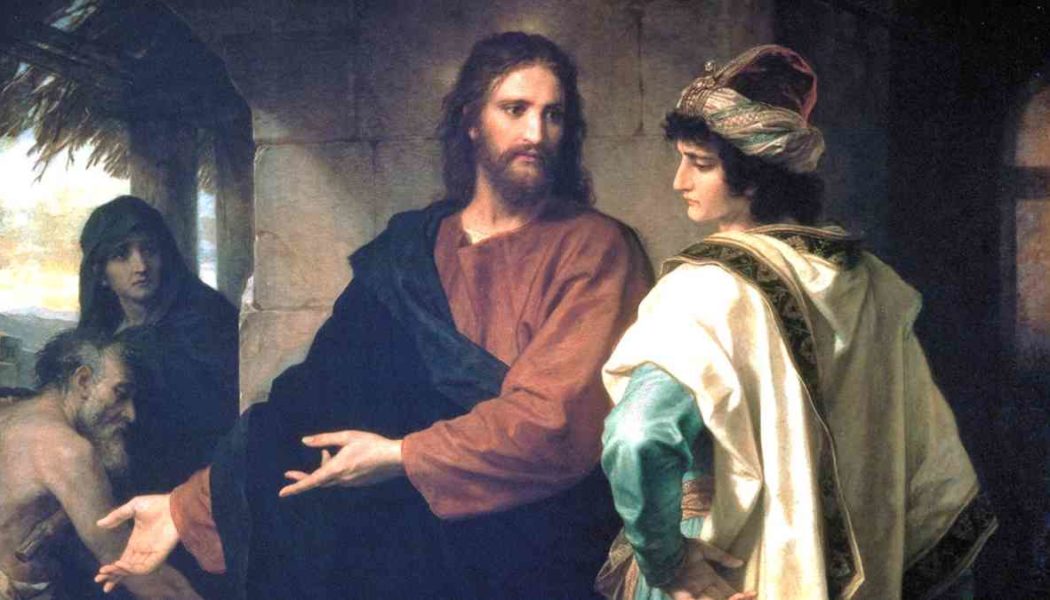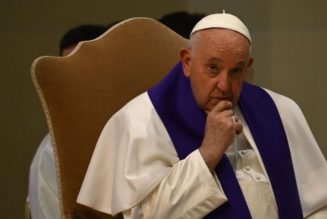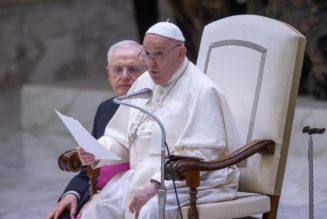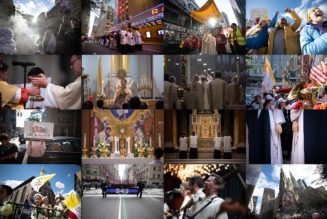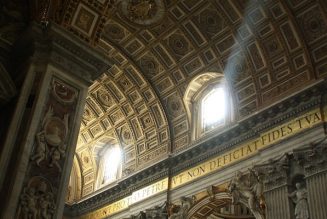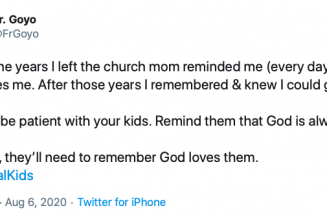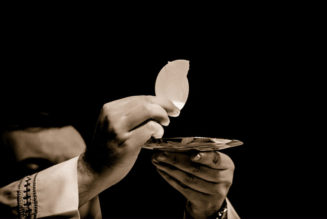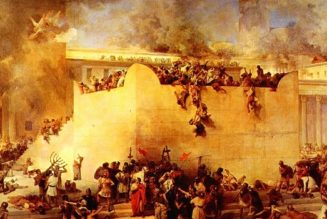
Too often, when we look in the mirror, we see a dream version of ourselves instead of what is in front of our eyes.
We so badly want to be the “best version of ourselves” that this is all we see. But then, when we get a glimpse of our true selves, it can be jarring — like seeing a picture of ourselves and saying, “Yikes. I thought I looked better than that!”
That is what happens to the rich young man when he meets Jesus on the 28th Sunday in Ordinary Time, Year B. Jesus insists that we have each have the same face-to-face encounter with him, give up the lie, and see who we really are, in him.
We probably think of our relationship with Jesus in exactly the way the “rich young man” in the Gospel reading this Sunday thinks of his.
When the young man asks Jesus how to attain eternal life, Jesus lists commandments he must follow. The young man says he has fulfilled them all. We have too. We are not murderers, adulterers, thieves, liars, or swindlers. We haven’t abandoned our families.
But then Jesus calls our bluff. He tells the rich young man: “You are lacking in one thing. Go, sell what you have, and give it to the poor, and you will have treasure in heaven; then come, follow me.” That is when the real young man emerges. “At that statement his face fell, and he went away sad, for he had many possessions.”
The truth is, our dream of being Jesus’s special friend has been pushed away too often by other aspirations. We are constantly thinking of what kind of person we could be that’s better than what we are. Usually, though, we want to be more attractive, more important, and more “with it” than others. But the more we define ourselves according to those priorities, the more “possessions” we amass, and the further we are from being the special friend of Jesus we dream we are.
The good news is, Jesus doesn’t actually want the “dream you.” He’s seeking out the real you, stripped of “possessions,” be they material or mental, so that he can bring the real you to be with the real him for eternity.
“How hard it is for those who have wealth to enter the kingdom of God!” says Jesus.
As proof that the rich young man is just like us, the apostles react strongly to that. If people like us can’t get to heaven, “Then who can be saved?” they ask.
“For human beings it is impossible,” says Jesus, “but not for God. All things are possible for God.”
How does God make this possible? First, by giving us wisdom.
The words of praise for wisdom in the First Reading are taken from the Old Testament book of The Wisdom of Solomon. King Solomon chose wisdom over everything, and the First Book of Kings calls him the wisest human being ever. In Sunday’s reading, he chooses wisdom over riches, good looks, and even health. Ultimately, though, it was not enough. Solomon died disgraced, having rejected God and fallen into idolatry and immoral relationships.
It is the same with us: Wisdom is greater than all those false dreams about ourselves. But wisdom needs to be accompanied by humility: We have to ruthlessly see our own shortcomings and do what is necessary to overcome them.
The first thing that is necessary is to meet Jesus Christ. When the rich young man faced Jesus on the road, he was facing him for the first time. We shouldn’t make that mistake. When we die and meet him in judgment would would be a terrible time to discover that we have built up layers of self-deception and priorities that shut God out.
There are three ways we can have that life-giving encounter with God ahead of time.
The first place we meet Jesus is in the Scriptures.
As St. Jerome put it, “Ignorance of the Scriptures is ignorance of Christ.” The Second Reading, from Hebrews, takes that a step further, saying that ignorance of the Scriptures is ignorance of yourself. “The word of God is living and effective, sharper than any two-edged sword,” it says, “penetrating even between soul and spirit, joints and marrow, and able to discern reflections and thoughts of the heart.”
If we encounter God’s word prayerfully and honestly, he will show us who he is and who we are. “No creature is concealed from him,” says the reading, “but everything is naked and exposed to the eyes of him to whom we must render an account.”
If we want to know him, we have to meet him where he can be found: in Sacred Scripture. The Church has always “venerated the divine Scriptures as she venerated the Body of the Lord,” says the Catechism, before quoting Psalm 119: “Your word is a lamp to my feet and a light to my path.”
Scripture is the first path out of the rich young man’s trap.
The second way to meet Jesus is to stop navel-gazing and start serving others.
When the rich young man approaches Christ, he is clearly determined to improve himself. But then Jesus tells him that improving himself isn’t the point. Christianity is not a method of “becoming the best version of yourself” — it’s a way of radical self-gift, a command from God to give away whatever version of yourself is right here, right now.
“You are lacking in one thing,” Jesus tells the rich young man. Then he instructs him, “Go, sell what you have, and give to the poor and you will have treasure in heaven; then come, follow me.”
What was the “one thing” the young man was lacking? It was the same thing Solomon the wise was lacking: love — friendship with Christ, service to others.
The same St. Jerome who devoted his life to Scripture studies knew this. When his region was flooded with refugees, he left his desk to serve them. “Today we must translate the precepts of the Scriptures into deeds,” he said. “Instead of speaking saintly words, we must act them.”
This proves to be a bridge too far for the young man. He walks away sad, and Christ tells his apostles that riches ultimately thwart us by drawing our hearts from their true purpose, but giving all repays us a hundred times over.
We live in America, the land of the rich and young, where much of our time is spent earning and spending, and where, when we sacrifice, it is often so that we will look youthful, attractive and successful. The faith becomes a mental exercise for us, an act of virtue signaling, while our true focus is on ourself. But, as Pope Francis put it to bishops who were meeting in Philadelphia, “A Christianity which ‘does’ little in practice, while incessantly ‘explaining’ its teachings, is dangerously unbalanced.”
There is a third place we can meet Jesus, right now, though, in a way the rich young man couldn’t.
When we get in the communion line, we are walking in the footsteps of the rich young man. As we wait our turn to receive Our Lord in the Blessed Sacrament, we can pray exactly the prayer he prayed: “Good Teacher, what must I do to inherit eternal life?”
Then it’s a matter of listening. Back in the pew, and in prayer during the week, hear what God says.
He will personalize a version of what he told the rich young man: “Follow the commandments,” he will say, and specify the ones we most need to hear. Is it that we don’t honor God enough — or that we don’t honor our parents, spouse, or children enough? Is it that we make money our highest priority — or is it pleasure or position for us? He will ask us to purge ourselves of our pet sins and put him in first place.
But he won’t stop there. He will say, “You are lacking one thing,” and invite us to love him and serve. If we ask him to show us how, we will see opportunities come before us in the days ahead: Opportunities at work, in our community or at our parish. Opportunities to stop focusing on ourself and start focusing on those around us.
We have a help in this that the rich young man never dreamed of: We don’t just talk to Christ, we unite with him, body, blood, soul and divinity in the Eucharist.
A briefer version of this appeared here.
Image: Hofmann, Rich Young Ruler 1889, wiki-media.
